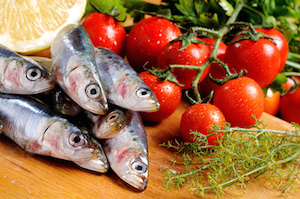Internationally, prostate cancer is the fourth most common cancer, and in men is the second most common after lung cancer. In New Zealand, prostate is the most commonly diagnosed cancer and the third most deadly.
Diet and lifestyle factors have long been linked to an increased incidence of all types of cancers. Research conducted by Dr Karen Bishop of the University of Auckland’s Cancer Research Centre has found a Mediterranean style diet is beneficial for men with prostate cancer.
The Mediterranean diet is usually high in olive oil, fruit and vegetables, legumes (pulses), whole-grains and poultry with some fish and seafood. Consumption of red meat, dairy products and processed or refined foods is traditionally low.
The small-scale pilot study, monitored men mainly from the Auckland region who had diagnosed prostate cancer and adhered to a Mediterranean-style diet for three months. For this study, the traditional Mediterranean diet was augmented with other foods known to reduce inflammation including broccoli, pomegranate juice, salmon (an oily fish) and green tea.
“We showed that dietary change to a Mediterranean-style diet is both achievable and beneficial for men with prostate cancer in New Zealand, albeit in a small and motivated group,” she says. “While there have been many studies looking at the impact of this diet on clinical indicators of disease, this is the first time such a study has been carried out in men with prostate cancer in New Zealand.
“This result adds weight to the notion that a low-inflammatory, high antioxidant diet may benefit men with prostate cancer,” says Dr Bishop.
“Significant reduction in DNA damage was found especially where the men adhered closely to the Mediterranean-style diet and increased their consumption of pulses and green tea,” she says.
“This diet is most effective where men seek to improve their health outcomes and are willing to take on board new ways of eating,” says Dr Bishop. “It’s not so much a prescriptive diet, but more a new way of eating.”
“It’s not too far removed from the usual kiwi way of eating, depending of course on an individual’s existing diet,” she says. “Anyone into fast foods is going to find this is a huge change.”
A more western-style diet, high in processed foods, is associated with an increased incidence of prostate cancer.










Join the Discussion
Type out your comment here:
You must be logged in to post a comment.